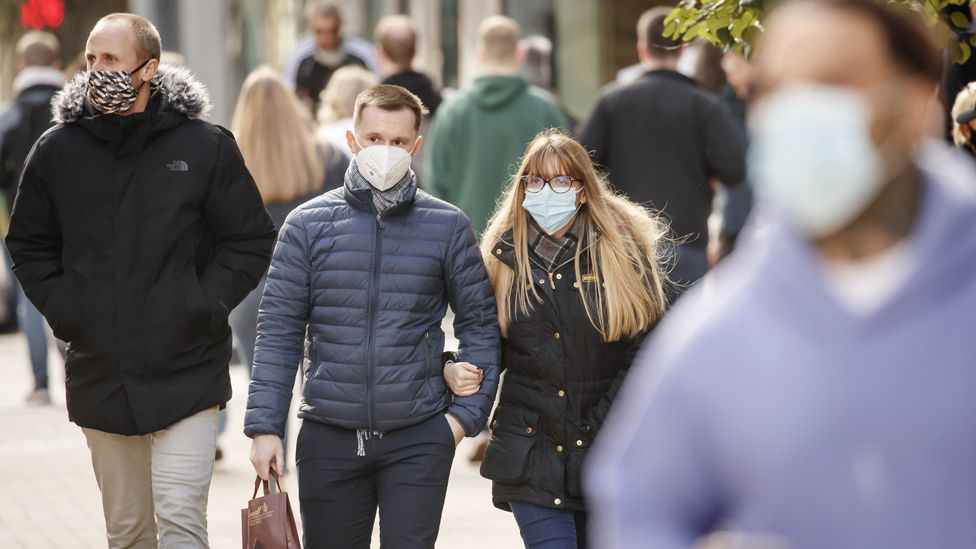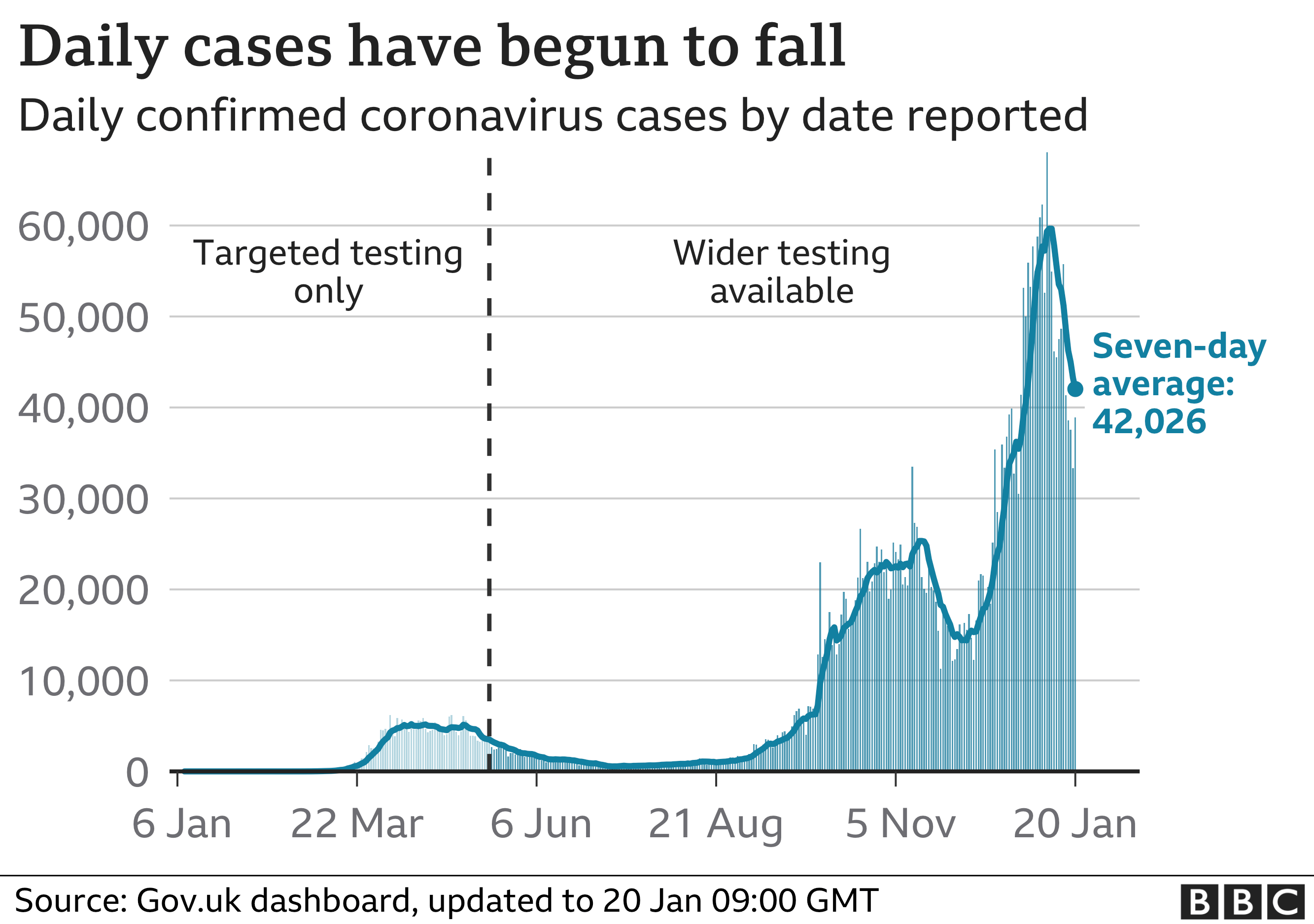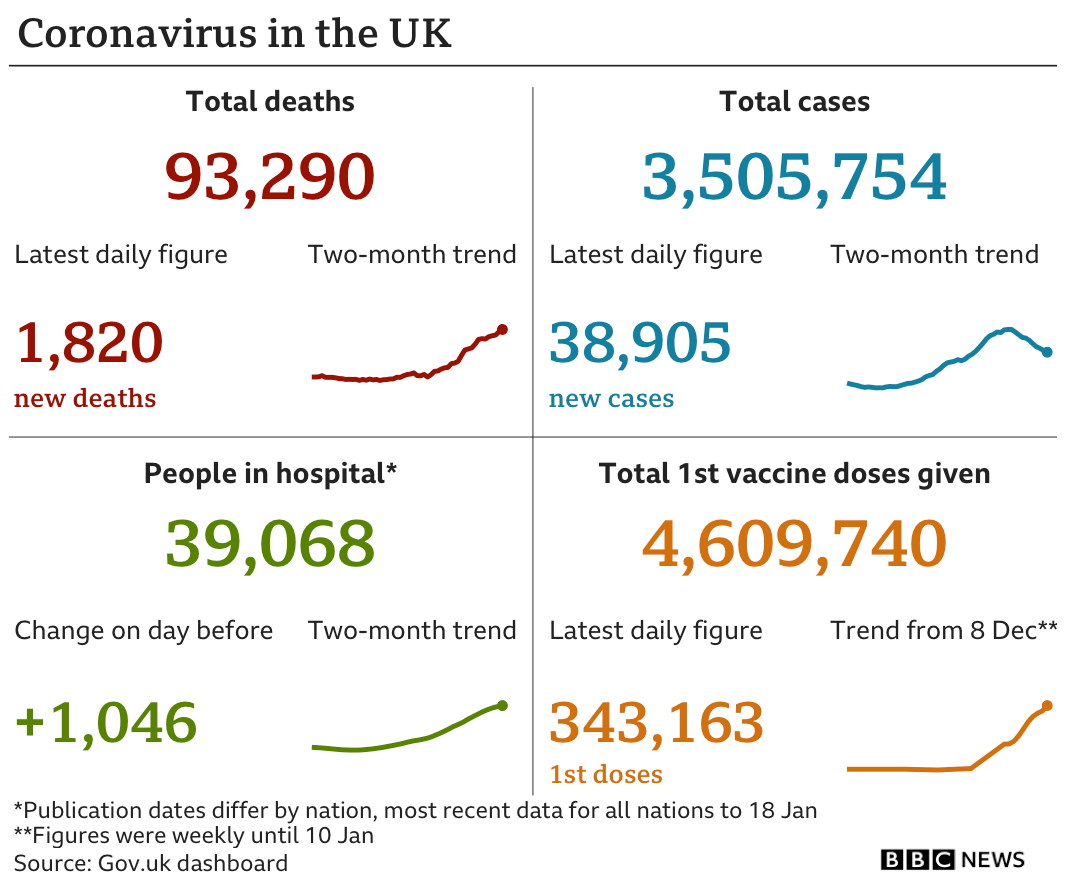
Infections in 6-15 January were up by 50% on early December, with one in 63 people infected, Imperial College London's initial findings suggest.
Swab tests from 143,000 people indicate 1.58% had the virus during in early January - up from 0.91% in December.
Ministers say the report does not yet reflect the impact of the lockdown.
The latest round of results from Imperial College's
React-1 infection survey - one of the country's largest studies into Covid-19 infections - are interim with the full set of results to be published in a weeks' time.But Imperial College London's Prof Paul Elliott warned if the high prevalence continues "more lives will be lost".
The report also says there are "worrying suggestions of a recent uptick in infections" and Prof Elliott said the third lockdown - introduced on 6 January - was not having the same impact as the first, in April.
London had the highest level in the January period - 2.8%, up from 1.21% in early December.
Before the Covid rules were tightened, the restrictions faced by people in England varied depending on where they lived.
The researchers say the government's latest daily case figures may reflect a drop in cases just after Christmas, which is only now being registered.
And they suggest infection levels may have gone up in early January as a result of people's activity increasing after the Christmas holiday period.
They admit there is some uncertainty in their data amid a "fast-changing situation".

The past few days have seen a slowdown in daily cases reported daily by the government but the Imperial College London researchers say their data is more up to date because it does not rely on those being tested developing symptoms and then waiting to have their infections confirmed by a laboratory.
The UK recorded another all-time high of daily coronavirus deaths on Wednesday. A further 1,820 people died within 28 days of a positive Covid test, according to government figures - taking the total number of deaths by that measure to 93,290.


The findings of the study are seemingly at odds with recent figures from NHS Test and Trace, which has been reporting recent decreases in daily infections and has prompted some experts to suggest that we might be beginning our journey out of the woods.
The researchers behind the study say the test and trace figures may be reflecting an initial drop in infections just after Christmas, which is only now being registered on the official figures. It takes time for infection to turn into symptoms, for test results to be turned around and then put into the system.
The study's more up to date findings indicate that the fall in infection levels did not continue to fall in the first two weeks of January and may even have gone up. So why has this happened?
Data on people's movements has shown that there's been increased activity which the scientists involved say has kept transmission of the virus at a high level. The Department of Health says that the study does not yet reflect the impact of the lockdown in England.
But if this trend continues, say the scientists, the numbers admitted to hospital with severe Covid illness, will not fall in the short term, as some had hoped.
This is one set of figures over a short number of days so there might be a more optimistic picture when the study reports its full set of results in a week's time. But there is no getting away from the fact that ministers will be disappointed not to have seen a fall at this stage.
Unless things change, even tougher measures will have to be considered.

Prime Minister Boris Johnson said there will be "tough weeks to come" but he hoped there would be a "real difference" by spring as the vaccine programme accelerates.
It comes as another 60 NHS Covid-19 vaccination centres in England, including a mosque in Birmingham and a cinema in Aylesbury, will welcome their first patients later.
Ministers have sought to reassure people in the top four priority groups for the Covid vaccination that they will get their jab by the government's mid-February target, following complaints from some GPs about unpredictable supplies.
Some 4.6m people in the UK have now received the first dose of a Covid vaccine.
'Immense pressure'
Facebook mobility data, which tracks people's movements, suggested a fall in activity at the end of December but a rise at the start of the new year.
And Prof Elliott said everyone should "reduce their mobility as much as we can".
A new, more transmissible variant and the fact larger households and deprived communities were more likely to be affected, may also be factors.
The Imperial survey is one source of data used to estimate the UK's reproduction (R) number, along with other surveys, from the Office for National Statistics (ONS) for example, and figures on confirmed cases and hospital admissions.
The researchers hope to recruit people who have been vaccinated to future surveys but added it would be "a large number of weeks or months" before that was possible.

- TESTING: How do I get a virus test?
- LOOK-UP TOOL: How many cases in your area?
- YOUR QUESTIONS: We answer your queries
- THE R NUMBER: What it means and why it matters
- TEST AND TRACE: How does it work?

Prof Elliott said the data would be monitored closely.
"To prevent our already stretched health system from becoming overwhelmed, infections must be brought down," he said.
"If prevalence continues at the high rate we are seeing, then hospitals will continue to be put under immense pressure and more and more lives will be lost."
Health Secretary Matt Hancock said the React findings showed "we must not let down our guard over the weeks to come".
"It is absolutely paramount that everyone plays their part to bring down infections," he said.
"This means staying at home and only going out where absolutely necessary, reducing contact with others and maintaining social distancing."


- DOCTOR CHATTERJEE: With another lockdown in place, how can we manage our health and wellbeing without feeling overwhelmed?
- RADIO 1 BREAKFAST BEST BITS: What's Greg James been up to?


How have you been affected by the issues relating to coronavirus? Email haveyoursay@bbc.co.uk.
Please include a contact number if you are willing to speak to a BBC journalist. You can also get in touch in the following ways:
- WhatsApp: +44 7756 165803
- Tweet: @BBC_HaveYourSay
- Please read our terms & conditions and privacy policy
If you are reading this page and can't see the form you will need to visit the mobile version of the BBC website to submit your question or comment or you can email us at HaveYourSay@bbc.co.uk. Please include your name, age and location with any submission.
"may" - Google News
January 21, 2021 at 01:36PM
https://ift.tt/3qFmIOM
Covid: England's virus levels 'may have risen in January' - BBC News
"may" - Google News
https://ift.tt/3foH8qu
https://ift.tt/2zNW3tO
Bagikan Berita Ini














0 Response to "Covid: England's virus levels 'may have risen in January' - BBC News"
Post a Comment